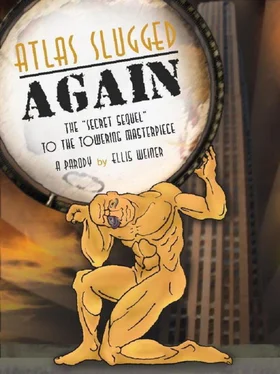Ellis Weiner - Atlas Slugged AGAIN - The Secret Sequel to the Towering Masterpiece
Здесь есть возможность читать онлайн «Ellis Weiner - Atlas Slugged AGAIN - The Secret Sequel to the Towering Masterpiece» весь текст электронной книги совершенно бесплатно (целиком полную версию без сокращений). В некоторых случаях можно слушать аудио, скачать через торрент в формате fb2 и присутствует краткое содержание. Год выпуска: 2015, Жанр: humor_satire, на английском языке. Описание произведения, (предисловие) а так же отзывы посетителей доступны на портале библиотеки ЛибКат.
- Название:Atlas Slugged AGAIN: The Secret Sequel to the Towering Masterpiece
- Автор:
- Жанр:
- Год:2015
- ISBN:нет данных
- Рейтинг книги:3 / 5. Голосов: 1
-
Избранное:Добавить в избранное
- Отзывы:
-
Ваша оценка:
- 60
- 1
- 2
- 3
- 4
- 5
Atlas Slugged AGAIN: The Secret Sequel to the Towering Masterpiece: краткое содержание, описание и аннотация
Предлагаем к чтению аннотацию, описание, краткое содержание или предисловие (зависит от того, что написал сам автор книги «Atlas Slugged AGAIN: The Secret Sequel to the Towering Masterpiece»). Если вы не нашли необходимую информацию о книге — напишите в комментариях, мы постараемся отыскать её.
Atlas Slugged AGAIN: The Secret Sequel to the Towering Masterpiece — читать онлайн бесплатно полную книгу (весь текст) целиком
Ниже представлен текст книги, разбитый по страницам. Система сохранения места последней прочитанной страницы, позволяет с удобством читать онлайн бесплатно книгу «Atlas Slugged AGAIN: The Secret Sequel to the Towering Masterpiece», без необходимости каждый раз заново искать на чём Вы остановились. Поставьте закладку, и сможете в любой момент перейти на страницу, на которой закончили чтение.
Интервал:
Закладка:
“You have heard men condemn slavery. Yet even the slave produces something of value, and is given something of value in return—food, clothing, shelter, and the harmonicas with which he creates his distinctive music. What is objectionable about slavery is not the fact that the slave must work—for all men must work—but, rather, that his freedom is curtailed by means of force. What is shameful about slavery is not that the slave is prevented from receiving or sharing in the profits derived from his labor—for no man may receive or share in the profits of any man’s labor unless he owns the company for whom others labor—but, rather, that he is unable to quit his job if he so chooses. End slavery, forbid that application of force, and the slave is able to exercise his freedom, pursue his values, and live a human life by laboring for the owners of companies under conditions he is free to quit whenever he so chooses.
“How much worse is the enslavement of the mother by the fetus! For what force is applied by the fetus to the mother, to ensure and coerce her support of the parasite that literally feeds off her? The worst kind of force there is: the force of public opinion. Women who become pregnant must carry the baby to term and give birth to it, or they are condemned and shunned by so-called polite society. Worse, the fetus does no meaningful work. It creates nothing. It transforms nothing. It grows, manufactures, refines, harvests, or assists in, nothing. It creates no immortal works of art that inspire countless thousands over the centuries. And then, not content merely to enslave the adult female woman human individual-type person whom it holds in this unspeakable bondage, it provides its slave with neither food, nor clothing, nor shelter, nor harmonicas. Indeed, it insists the mother provide it with food, create its ‘clothing,’ and provide her body as its actual shelter. In so doing it robs the mother of nutrients, deforms her body, stimulates in her all manner of distasteful reactions and excretions, distorts her appetite, subjects her to exhaustion, transforms her into a quasi-public plaything whose belly may be groped and caressed by strangers on demand, and in the end dooms her to a prolonged exposure to excruciating pain and possibly mortal danger, prior to its termination of her enslavement—after which commences a new kind of enslavement, as the infant uses its absolute helplessness to control her every action, emotion, and thought, and to require increasing amounts of the mother’s income in order to survive.
“Acceding to this kind of physical, emotional, and moral subjugation may be appealing to men for whom society’s approval and the sentimental contemplation of cultural stereotypes is appealing. But I am not one of those. And so I will terminate this pregnancy and retain my human freedom.”
Nathan A. Banden took this all in with an outwardly stoic calm. Finally he said, “Then where will you have this procedure done? May I accompany you to it, at least?”
“No,” she said. “You may not.”
“Oh, Dragnie, Dragnie, Dr—“
“You may not because there is only one physician I trust with this kind of procedure, and he practices in a place where you may not go.”
Banden did not chuckle. He did not chuckle because he laughed. It was the laugh of an anxious man uncertain of what another human being had said to him but fearing its content would reveal itself to be objectionable. “Where does he work? In a prison?”
“In Glatt’s Gorge.”
The young man, unafraid to reveal the limitations of his education and disclose his inability to understand what had just been said to him, replied, “Huh?”
“You’ve never heard of Glatt’s Gorge?”
“Of course I’ve heard of it. But I thought it was a… you know, a mythical place. Like the Garden of Eden or Shangri La.”
Dragnie permitted herself a slight smile. Then she withdrew the permission and the smile vanished. “It is quite real. I have been there. And that is where Doc Hastings still resides. I would not trust anyone else with this matter.”
“But why can’t I go with you?”
“Because,” Dragnie said in a tone of wistful nostalgia. “No one except a very privileged few is allowed there. It was the perfect society. There you would find wealthy people, and the people who love them or work for them, creating a self-sufficient community of gentlemen farmers, hobbyist craftsmen, amateur civil engineers, and artists-in-residence. There you would find a world-renowned philosopher running a chicken-and-waffle diner while expatiating on ‘truth,’ or a brilliant composer writing an opera about Marcus Aurelius for a full orchestra and a cast of thirty, to be performed by three people playing ukeleles. There you would discover a society in which everything, from obtaining electrical power to asking someone what time it is, was mediated by money, which was minted right there in the Gorge by an internationally-acknowledged metaphysician whose hobby was the minting of money. It was a place where a lecture on the irreducible value of currency and of its unregulated use in the valuation and conduct of all human affairs could be attended for a token fee of twenty-five cents. It was an entirely self-sufficient place because it was a place entirely underwritten by private wealth. In short, it was Paradise.”
“You keep saying ‘was.’ What is it now?”
“Exactly the way it was ten years ago.”
“It sounds wonderful, darling,” Banden sighed. “But can’t you vouch for me and get me in?”
She shook her head regretfully, because it was her head, and it was full of regret. “It’s just not possible.”
The change in Banden was sudden and volcanic. Whatever effort he had made at a sympathetic hearing of Dragnie’s explanations and a courteous response to them were now invalid. Anger rose within him like a fever; his normally pale white skin grew pink with agitation and ire. “Oh really?” he cried. “Then what you’re telling me is, you refuse to have my baby, and you refuse to even allow me to be present at its termination. And why? Because I’m not a millionaire?”
“No,” Dragnie said rationally. “It’s because—“
“Never mind,” he cried. “I can see now what I’ve meant to you this past month—not a boyfriend, not even a lover, but a plaything, to amuse you for the few weeks you’d be away from home and your world-famous, other, long-term, ‘steady,’ boyfriend.”
“Nathan, don’t be silly—“
“And now I’m ‘silly.’ Very well.” He made a visible effort to regain his composure, drawing himself up to his full height and extending himself out to his complete width. “I thought we had something special, Dragnie. I see now I was wrong. I won’t trouble you with my presence any further. If you change your mind, and wish me to accompany you to your tycoon’s paradise, I shall be at home, living with my parents.”
He turned and strode from the room.
Chapter 2
A Chair is Not a House
Dragnie checked her co-ordinates and glanced out the window of the small plane that responded to her will as with unerring precision she flew it through the air of the atmosphere. A faint smile played about her lips. Visible below her was precisely the forbidding series of mountain crags she expected to see, identical to those she had seen ten years previous when, in pursuit of another plane, she had unknowingly penetrated the optical illusion shielding this valley from the eyes of the world and had crash-landed in Glatt’s Gorge. With a clean turn of the rudder and a firm, clean adjustment of the flaps, she began her descent toward the small airstrip that she knew, in her mind, would reveal itself as she began her skillful, controlled, clean descent.
Читать дальшеИнтервал:
Закладка:
Похожие книги на «Atlas Slugged AGAIN: The Secret Sequel to the Towering Masterpiece»
Представляем Вашему вниманию похожие книги на «Atlas Slugged AGAIN: The Secret Sequel to the Towering Masterpiece» списком для выбора. Мы отобрали схожую по названию и смыслу литературу в надежде предоставить читателям больше вариантов отыскать новые, интересные, ещё непрочитанные произведения.
Обсуждение, отзывы о книге «Atlas Slugged AGAIN: The Secret Sequel to the Towering Masterpiece» и просто собственные мнения читателей. Оставьте ваши комментарии, напишите, что Вы думаете о произведении, его смысле или главных героях. Укажите что конкретно понравилось, а что нет, и почему Вы так считаете.












